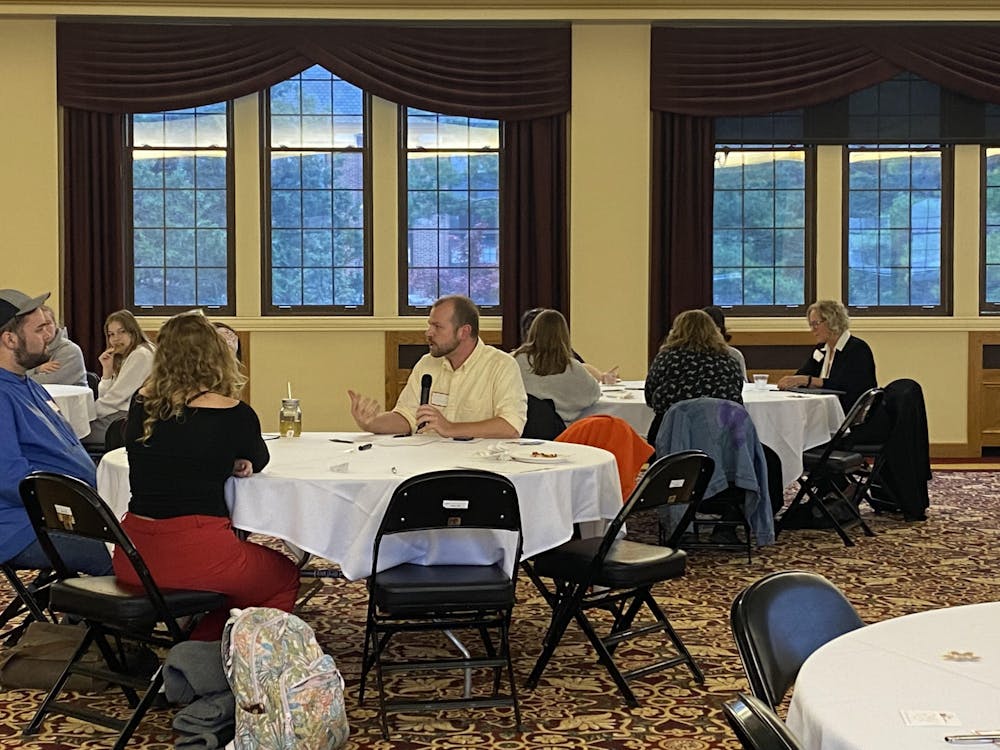Conversations That Matter explores womanhood and the right to it

Bryan Whitledge (center), an archivist for university digital records in the Clarke Historical Library, participates in a group discussion during a Conversations that Matter event, Sept. 28 in the Powers Ballroom.
What does it mean to be a woman? Is womanhood a protected right?
A discussion revolving around these questions took place on March 23 at the Bovee University Center Rotunda. Around 45 students, faculty and alumni engaged in a Conversations That Matter event, discussing important topics related to womanhood over a catered dinner including beans, rice, chips and soft tacos.
Nikita Murry, director of Diversity Education, organized the event. She said her goal with this discussion was for people to come together, listen to one another and better understand the topic.
“It's a really good way for people to come together, and food helps us to connect with one another,” Murry said. “So we come together, we talk about the topic, but more than anything, we practice being able to listen to other people, and listen to what they have to say and their perspective.”
JoEllen DeLucia, a professor in the department of English, was the keynote speaker of the event and did a presentation on the history of womanhood.
“There’s an equally really very difficult and complicated history surrounding the word ‘woman,’” she said.
DeLucia said historically the definition of a ‘right’ has been complicated as well. For example, she provided an example about John Locke, a British philosopher with colonialist ideas to claim territories of Native American people.
“Rights are definitely a claim to power over (a) person,” DeLucia said.
Women in history were considered to be property, DeLucia said. She said, in Mary Wollstonecraft’s book “The Wrongs of Woman”, a woman was imprisoned because her husband said she was insane.
In the beginning of the 20th century, women create a suffrage movement, DeLucia said. However, she mentioned that the movement was segregated. For example, in a march for women’s rights, Ida B. Wells, a Black suffragist, was asked to march in the back of the crowd.
DeLucia said that when thinking of women's experiences, people often forget those of women of color, women of a lower class and transgender women.
After the presentation, attendees were asked to discuss the following three questions, with people at their tables, for 15 minutes each.
· What do you find challenging about navigating the topic of womanhood?
· What does it mean to claim being a woman as a right? How do women’s rights relate to other types of rights? Is there a hierarchy when it comes to rights?
· How have you seen “women” as a category used in conversations about politics, schools and other institutions? Have you found its use helpful or divisive?
Norma Bailey and Joyce Hendrix are retired Central Michigan University professors. They talked about women rights being violated. For example, they said it happens in cases of domestic violence and in banning abortion rights.
“Control over your body is … important for all persons,” Hendrix said.
Third-year student, Alyssa Vasquez, said the question of womanhood has been confusing for her.
“I think womanhood should be able to be defined however people want to and … if (it) isn’t well-defined, that’s also okay,” Vasquez said.
She said she attended the event to learn more and educate herself on the topic.
DeLucia said the understanding of womanhood depends on how you define the language.
"It was a pretty touch question," she said.
Kevin Wilson, assistant director for the Office for Institutional Diversity, Equity and Inclusion (OIDEI), said he helped Murry facilitate the event.
Wilson said his goal for the event was for attendees to take what they learned with them.
“It is such a broad topic and I don’t expect people to get an answer outside of the yes or no,” Wilson said. “But all the different types of answers are really what I expect people to take home with them.”
Murry said learning through conversation was the most important part of the event.
“If we don’t take the time to listen to one another, then we will never know where one another is coming from,” she said. “We can have the opportunity to clear up something that might be a misunderstanding or a myth."
“I’m open to what people want to talk about," Murry said.
For the past 10 years, OIDEI has hosted Conversations That Matter to welcome the discussion of hard topics, Murry said. This event was the last of the spring semester.
Email suggestions for future event topics to diversity@cmich.edu.



